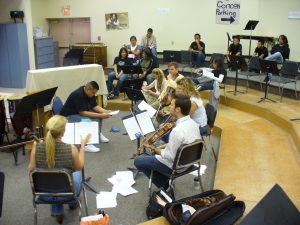November is National Native American Heritage Month, and Classical Music Indy is always looking to highlight unique projects that impact our music world. This year, we were thrilled to discover the Native American Composers Apprenticeship Project, a part of the Grand Canyon Music Festival. We spoke with Clare Hoffman, Co-Founder and Artistic Director of the festival, about how their program trains Native American students from rural Arizona to compose music.
Native Voices Shall Be Heard: Native American Composers Apprenticeship Project
The Native American Composers Apprenticeship Project (NACAP) is an outreach program of the Grand Canyon Music Festival, which was founded in 1984 by Clare Hoffman and Robert Bonfiglio. In its second year, the festival began outreach and educational programming with a focus on serving students of rural schools in the Hopi and Navajo Reservations. In 2001 Hoffman and Bonfiglio decided take their work a step further by launching NACAP. Founders of NACAP state “the program develops musical literacy and enhances critical thinking and decision making skills through the study of music composition. It introduces [Native American] students to European ‘classical’ music techniques, develops their understanding of their own musical heritages, and how to use that knowledge to develop their own compositional voices.”
Co-founder Clare Hoffman reflected that “…we wanted to show up more than once a year. We wanted to leave behind something that would have a lasting impact. The goal of NACAP is to give the students we work with who have been isolated by geography and the dominant culture a voice through the empowering artistic experience; to give them the tools they need to express themselves and to get their voices out in the world.”

Students workshop compositions with string quartet.
The program achieves just that. Over the course of one week, students work with up to three resident composers and a professional string quartet to realize the vision of their compositions. Day one begins with an overview of notation and guidelines for how to write a string quartet. Following that, the next few days are spent getting ideas down on paper. Once the compositions are ready, a professional string quartet gives a workshop performance of each student’s work. After hearing it live for the first time, students can make revisions to their compositions if necessary. After the edits, the work is given one final workshop session, a performance at their local high school assembly, and the premiere of their composition as part of the Grand Canyon Music Festival.
Hoffman says “the impact on the students is extraordinary.” She believes NACAP empowers students in a way that isn’t happening anywhere else: “the thing about NACAP is that kids are treated with respect. Native kids and Native people are so rarely treated with respect. [In this project] They’re the star, they’re the composer, they’re the boss. You see it in the kids faces, you see their sense of pride and they start to think ‘if I can do this, I can do other things too.’” Many students that come out of the program go on to continue to write music after graduation and contribute to their communities with their musical voices. Additionally, some of the student compositions go on to be performed outside of the festival, which affects the broad music industry in America by bringing Native American voices into the professional classical world.
Classical music is for everyone, and the work that NACAP staff, composers, performers, and students are doing exemplifies what can happen when young minds are given an opportunity to share their voice. To learn more about this outstanding project visit: grandcanyonmusicfest.org/nacap
Listen below to the 2016 composition by Xavier Ben performed live at the Grand Canyon Music Festival:
Audio Player






Leave a Reply